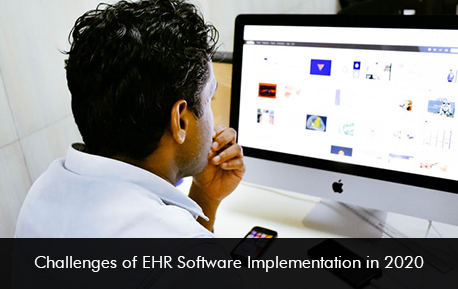EHR software adaption has been one of the most amazing developments in the digital healthcare system. Electronic Medical Records software (EMR) solutions provide patient-centered records available all the time which reduces the stress associated with clinical workflow. The real-time access to patient data including medications, lab results, histories, and diagnosis details improves the treatment process as the practitioner is well-informed to make proactive decisions regarding treatment plans.
Implementing an EHR software system comes with many challenges, whether it’s transitioning from a traditional paper record system to switching to a new EHR software. There are many potential challenges in implementing an Electronic Health Records software system. In this article, we will discuss the main challenges faced so that healthcare providers can be aware beforehand to ensure smooth adaption of the EHR software.
Hurdles in the EHR Software Implementation Process
Let’s look at the main hurdles or the roadblocks to the implementation process.
- Implementation Cost – The cost of implementing an EHR software system cannot be ignored. It requires a major cash investment and planned capital budget investment. The cost of purchasing and installing an Electronic Medical Records software solution costs about $15,000 to $70,000 per provider. These costs include hardware costs, software costs, training costs, and ongoing maintenance costs. It might be difficult for smaller medical setups and solo practitioner to arrange for the cash. To make life easier there are free and open-source EHR software options available which provide similar functionalities and set of tools.
- Staff Resistance – It’s a fact that most of us don’t like change because it may make us feel uncomfortable and put us in new testing waters. Hence, there is likely to be resistance to this change from clinical and support staff. Not everyone might be ready to take the technological leap! To open doors of acceptance promotions and a good marketing plan might be helpful.
- Training can be time-consuming – Training the medical staff to understand the software may consume a lot of time and effort from their part. Some staff members might see it unnecessary and hence not be motivated to train.
- Data Migration – Migration of existing data to a new EHR software can be quite a time consuming and difficult process. Also, the data contains sensitive information that needs to be migrated accurately to ensure consistent patient care.
- Privacy Concerns – Both patients and healthcare providers are not satisfied with the privacy and security offered by Electronic Health (EHR) Records. The EHR software systems are open to the threat of technological breaches like cyber-attacks. Most healthcare providers hence find paper records safer. During the EHR software selection process it is advised to go for software vendors that provide HIPAA Compliance for Meaningful Use to ensure maximum security round the clock.
- Interoperability – It is still a big challenge and obstacle for healthcare providers to build an interoperable system that enables the effective and efficient transfer of information between multiple providers. It is necessary to have the best care coordination to enhance patient outcomes.
Resources:
(2020). Retrieved 12 May 2020, from https://mobisoftinfotech.com/resources/blog/top-10-ehr-implementation-challenges-and-how-to-overcome-them/







